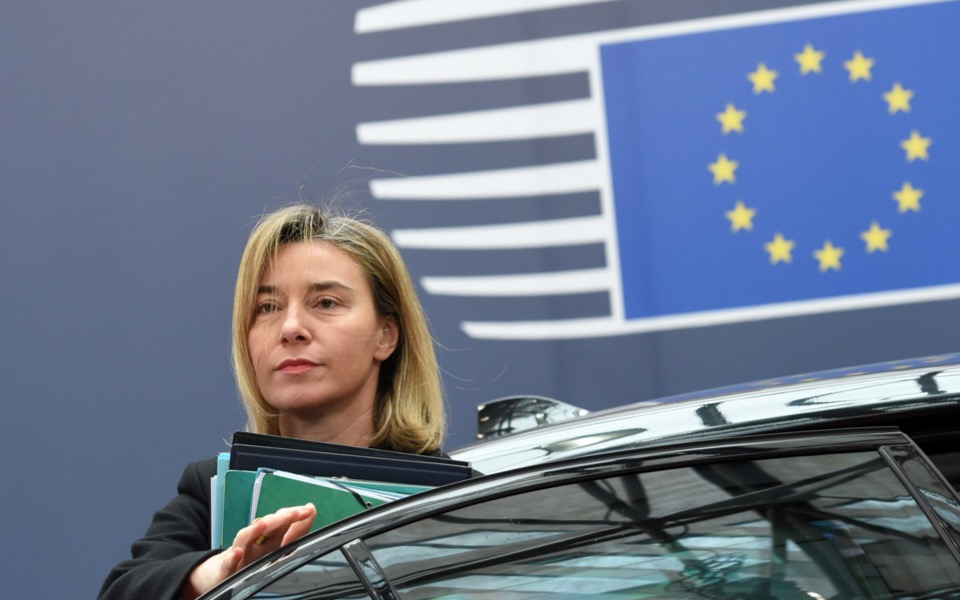In interview with Kathimerini, Mogherini says EU will throw weight behind name deal

The European Union will do everything possible to back the next steps in the agreement between Greece and Former Yugoslav Republic of Macedonia (FYROM) on the name dispute, but taking these steps is up to the two Balkan neighbors – their institutions and their people – the bloc's High Representative for Foreign Affairs and Security Policy Federica Mogherini tells Kathimerini in an interview.
The EU’s top diplomat voices her warm support for the settlement, saying that it “provides an inspiration to the rest of the region.” The deal, Mogherini believes, will be a catalyst for FYROM’s European membership ambitions, adding, however, that joining the bloc implies meeting all preconditions first.
Mogherini also commends Greek Prime Minister Alexis Tsipras and his FYROM counterpart Zoran Zaev for having shown “immense determination and political vision in bringing to resolution a very sensitive, historically complex issue.”
How do you view the agreement between Greece and FYROM with respect to the name issue?
The agreement announced by prime ministers Tsipras and Zaev is bringing to a close a long-standing issue between the two countries, and is in this sense truly historical. It importantly contributes to the transformation of Southeast Europe we have seen over the past years. It also shows that when differences between neighbors are addressed, with political will and determination, they can also be solved. The agreement provides an inspiration to the rest of the region where several bilateral disputes are yet to be resolved. And I believe the dynamic created needs to be built upon, in the interest of the two countries, the region and Europe as a whole. The idea of Europe was born in Greece, and now from Greece can come a breath of fresh air for our European Union.
What would such a solution mean for the countries, their prospects and role, as well as for the region?
I believe the agreement bears importance for both countries. It’s a win-win result. For Greece, it is a confirmation of the leading role you can play in terms of stabilization and regional cooperation in the Balkans as a whole. But this is also in the interest of each and every Greek citizen: if Skopje and the EU get closer, tensions in your neighborhood will be less likely, there will be new opportunities for Greek firms and it will be easier to work on our common security. If we don’t invest there, together as a Union, others will. For the former Yugoslav Republic of Macedonia, the agreement is a catalyst for its path toward the European Union. And for both countries and the region, it shows that with the spirit of dialogue, good neighborly relations and regional cooperation you build a common and more prosperous European future for everyone.
How confident are you that the agreement will be accepted (by lawmakers, in the referendum and through to the constitutional changes) and come into force, and what will happen if it doesn’t?
The European Union was supportive of the negotiations from the very beginning, but we were also clear that the talks and the agreement is between the two leaders, the two countries first and foremost. In this sense, the next steps are also in the hands of the two countries, their institutions and their people, while we as the European Union are ready to continue our support toward the implementation of the agreement with all the means that we have and as needed.
Both leaderships have shown immense determination and political vision in bringing to resolution a very sensitive, historically complex issue. I would not comment on single steps that might be taken or should be taken, each country needs to respect and follow its own democratic institutions and processes and needs time to do so.
How did the EU support the negotiations between the two sides and how will it follow up in the next stage?
First of all, this is an agreement between two countries, a member-state of the European Union and a candidate country that is part of Europe and aspires to join our European Union. While we in the European Union have been encouraging and supporting the negotiations process, we have not been involved in the substance of the agreement. This has been the work of the two parties, under the auspices of the United Nations and UNSG special envoy Matthew Nimetz. But we have been explaining the benefits of a mutually agreed solution, not just for the two countries directly concerned, but also for the region and Europe as a whole, both in terms of stability and security as well as prosperity.
The past year has been a year of intense engagement with Skopje and the Western Balkans as a whole. And we have seen some impressive results, not only in terms of reforms, but also in the democratic processes and in good neighborly relations, first with Bulgaria, now hopefully with Greece. The European Union will accompany the next steps of this historic agreement with all its means, including through multilateral diplomacy, dialogue and cooperation. And I am well aware of the series of steps that need to be taken on both sides, including most importantly the ratification of the agreement by the parliaments of the two countries.
Will the process of negotiations for FYROM’s accession to the EU start soon?
The enlargement process is merit-based and depends on the fulfillment of very specific and well-known criteria related mainly but not only to the rule of law, democratic institutions, economic development and EU standards. It is a strict process, but also fair. The European Commission recommended in April to the EU member-states to start the accession negotiations with Skopje. This would be credible and consistent with the progress achieved. Now the decision is in the hands of the Council, of the member-states. I have always believed that the Balkans – all of them – are part of Europe and should be part of our Union. It is the dream of my generation, which has witnessed the most recent war in European soil and which knows that the European Union is the strongest insurance against conflict.
Are you concerned by the strong reactions to the agreement in both countries? How do you respond to critics who say the deal is unacceptable?
We are fully aware of the sensitivity, the complexity and the historical context of the issue, so it is natural and understandable that people and institutions need time to debate any such agreement. Greece is a country of great history and I’m sure that all Greeks know that history is also shaping the future and not only commemorating the past.





